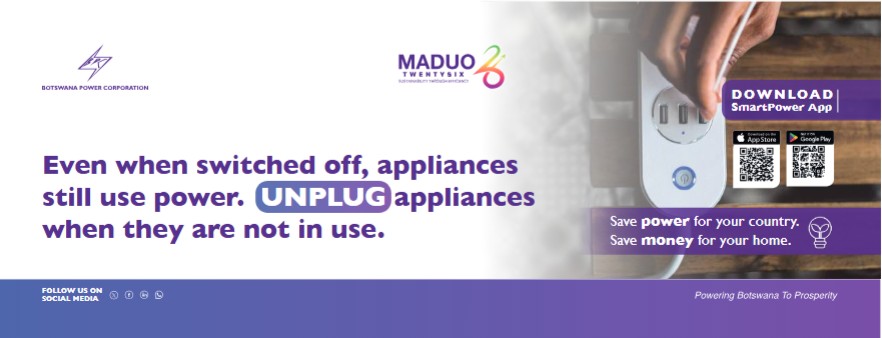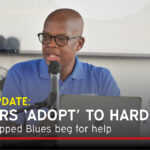What I’m about to share, someone might certainly have already experienced, perhaps many times over.
It is extremely easy to dismiss it as just another medical negligence story.
However, my hope is that you don’t, because we need to claim back our dignity, demand to be served by men and women who appreciate that they are tasked and remunerated for providing acceptable standards of health care.
Medicine and health are professions where people take an oath to serve; therefore sub-standard care should be shunned.
But at Princess Marina Hospital (PMH), there seems to be very few practitioners willing to provide a reasonable standard of professional care.
PMH SSU nurses have totally failed in their duty of care, and it’s staggering.
I fell ill with the deadly coronavirus over two weeks ago. I was in denial at first, and when I finally accepted, I believed that like some people, home remedies and over-the-counter-medicines would suffice. Boy, was I wrong!
I am a sickly person; I should have known that alone made me vulnerable.
It should also inform you, dear reader, that I am well acquainted with a hospital environment.
So, the events of the last two weeks have left me shaken, but not crushed. I am an extremely optimistic individual; my hope is that things change for the better.
Further, I hope those who promised to get to the bottom of this matter fulfill that promise.
After dilly-dallying, I sought medical attention. Monday 2nd, we’d all tested positive, save for my brother.
It’s a mystery. I woke up very early to discovered my pyjamas were damp. The virus had quickly progressed.
I felt feeble and couldn’t move a muscle. I would spend the next couple of hours consuming copious amounts of home remedies between prescribed drugs.
I have a guardian angel, my cousin Tirelo; she was concerned with my well being throughout and so she monitored me.
I was in an enfeebled state, coughing uncontrollably. Tirelo sensed that things might have taken a turn for the worse and called my daughter, who alerted my brothers to of my plight.
Panic-stricken, they rushed me to Marina ER. I don’t recall much of my first hour or two there.
I think I kept slipping in and out of consciousness. I remember being pushed on a wheelchair out of ER, the next thing I was on a bed next to a window shivering!
The room was nippy, like a mortuary; all windows were wide open, ‘for ventilation,’ they said, but torturous, during one of the coldest winter nights.
I recall asking the attending male nurse to get me blankets, and a pillow. He said there were no pillows, nor were there any blankets.
At this juncture, I was aware I had mild pneumonia, according to the X-ray.
I had laboured breathing, and grew tired with each effort, and for an asthma and sinusitis sufferer, I knew I was in serious trouble.
Nurses put me on a ventilator/oxygen, but it was so unpleasant and painful I was convinced it would kill me and not the virus or pneumonia.
I coughed until all contents of my bladder left freely. I had seen adults older than me in nappies, and had thought age was their reason, nope!
It was the coughing, the weakened muscles.
Now, this is where the real fight started.
The oxygen was such torture I couldn’t keep the mask on; it felt like the pressure used to inflate a tyre at a filling station.
It was even accompanied by a similar noise, the kind you’d hear whenever you visit a tyre fix outlet.
When it accidentally came off, the sound/explosion is akin to that very one you hear when your car tyres get changed.
One woman got such a fright she declared her death! Here’s where I realised I was in a pickle.
Most nurses at that ward are the meanest, most uncaring and barbaric lot I’d ever come across; together with one or two of the doctors.
The man who’d received me into the ward was so rough that my attention shifted from the very important task of breathing to the pain I felt on my arm as he attempted to fit the cannula.
When I screeched in pain, he was unbothered. Hey-ho, I was there to survive and not be a wimp. Inspecting his shoddy job, I worried that he might’ve missed the vein.
My brothers would later bring me blankets, a slight relief, I asked for Vaseline to lubricate my nasal passages,
water to moisten my mouth and throat. They’d brought everything on my bedside table, including a flask – hallelujah!
I asked for warm water from the nurses, it never came. Now I could focus on finding the right position for this mask, so my sinuses don’t hurt.
At this point I had no moisture in my mouth, throat or nasal passages; my tongue would repeatedly stick to the roof of my mouth.
When I called for assistance, I was ignored – again – for a while until I could gather sufficient strength to shout enough to communicate my annoyance.
These people would pass over a dying patient yet they weren’t busy.
The ward was forever noisy, machines competed with the nurses’ loud chitter-chatter.
When they did decide to leave their station, it was to only glance at the oxygen mask, or routinely check vitals.
I glimpsed over at my neighbour, he was quite, still. It took a few more peeks for it to register that he was long gone.
He looked peaceful and that made me wonder, as I fought for life, what for? He was quite small bodied, was at peace while I clung to life, for what? It had come to that.
At one point a repulsive woman came to my side. I felt a poke on my thigh.
The kind that you’d think someone was poking a dangerous animal. When I opened my eyes, I found an ill-favoured fat face.
‘RWALA MASK OO! RWALA O TLA RE TSENYA CORONA! THAT’S YOUR MASK!’ I tried to explain that my sinuses had suffered and I had accepted to rather die of suffocation.
She yelled again, didn’t bother to investigate why that was the case. Perhaps she was not competent to assist with that. I was fragile and teary!
I began to get angry with God. I asked Him where He was when I knew Him to love me; why was He nowhere to be found? Death seemed certain.
I’d been battling to breathe and my chest and back felt like someone had dropped a grenade in there.
Around midnight, I called for help again, which was typically delayed. There was a different male nurse – seated – with three other women walking about.
He turned to look at me and I waved. ‘Please elevate this bed at the head.’ He fiddled with the mechanism, but the bed wouldn’t budge; it was placed the other way round.
I would try sitting myself up, resolving to lean ever so slightly against the windowsill. The post midnight breeze wouldn’t let me.
Often, I’d remove the mask, suffocate, put it back on, shove more Vaseline into the nostrils, wipe it off, try breathing through the mouth, and repeat all of that.
Humph! It was taxing. My lungs were giving in. I wept, that my death would come in that manner; in a hospital ward manned by unsympathetic nurses.
It broke my spirit. I remembered many of the visions God had shown me in the last year. That’s when the despondency began to leave my spirit, and I prayed.
Psalm 23. My memory failed me, the verses were jumbled and I would get stuck on verse 4, ‘For thou art with me.’ This would be my prayer, this one line.
I’d meditate on it throughout in both English and Setswana, ‘Go nne O na le nna.’

At around three in the morning, they came to collect my deceased neighbour.
Shortly thereafter, an angel, in the form of a tall, dark, and handsome man with a stitch on his left eye, stood at my side.
He checked my pulse. I remember looking at his hands as he held my wrist, I thought them beautiful. In soliloquy, in almost a whisper, he said, ‘But these people, don’t they know this can be intoxicating… this is too much.’ And he reduced the pressure on that little nebuliser, a boon for me.
My ears were left with a rumbling sound, but for the first time in 8 hours, I could enjoy the benefit of the life-saving oxygen.
I could breathe, without that vein-busting pressure. ‘God is indeed with me,’ I consoled myself.
I would spend the next 9 days at Marina, 3 more in that abominable ward and 6 at the surgical ward, which was better but had its own faults.
At SSU, the brutality continued. The next morning, a young woman who seemed my daughter’s age arrived.
I’d watch her struggle to breathe, worse than me; her name, Eunice, from Extension 16, that’s all she said.
She was frail. Talking drained her. I would share my water with her, because when they gave us our pills, it was without liquid to swallow them.
At first I thought it was an oversight, nope! I couldn’t pick the 5litre bottle of water and indicated that to a doctor, she looked at me as though I was being silly for expecting her to cater that much for me.
I didn’t have strength, so I begged her with my eyes, and her conscience must have nudged her because she picked the bottle off the windowsill and placed in on my lap.
Still, it was too heavy for me to even tilt over to pour into my cup. I was disturbed by this lack of empathy.
Another doctor had remarked that she couldn’t administer drugs via IV because my cannula had fallen off.
I was perplexed. The same woman I’d overhear saying to a colleague that the woman in the bed adjacent to mine was smart to know to lie on her tummy, that she’d probably make it, how insensitive!
You should’ve seen us flip over to assume that sleeping position, the lass struggled though.
Eunice had tummy problems; she would from time to time call for help. By day two, I would do that for her; because those women ignored her, and she feared them. How tragic!
A doctor would finally come fit the IV. I felt blood streaming down my arm. I exclaimed that my blood had messed my pyjama top and pillow, and blankets.
Walking back to her desk, she turned and nonchalantly replied, ‘Oh, ga ona TP?’ (Don’t you have toilet paper) and that was it.
Of course I didn’t have it, I arrived there as an emergency patient. About the same time, another nurse berated me for failing to report that the water in my nebuliser had finished.
At one point, the lady in the bed opposite mine would leave the ward.
Mma-Mogapi would join us, about 55-60 years old. She was battling, and when she had managed to inhale enough oxygen to revive her, she realised she was exposed, wearing nothing but a soaking wet nappy. Her blanket kept falling off the bed, she was restless throughout. She complained of being cold.
Compounding her problem was that nappy, which made her even colder. I was saddened by how it took forever for her to be helped.
The next morning, I would watch in awe how a young female doctor, in dreadlocks, attended her with such grace.
She was tiny, her patient larger than her, but she helped her turn on her side, such care. Why weren’t these nurses that humane?
By Thursday night, I relied heavily on certain compassionate individuals. Yes, there were about three nurses and doctors who were, but the problematic thing was they worked in shifts.
There’s a man of mixed-race who I’d only seen the first day. When I referred to him as ‘doctor,’ that main Hitler who kept ignoring us, a woman who judging from her voice – could be in her late 40s or early 50s, said to me; ‘Ga se ngaka!’ (He is not a doctor) My goodness! It bordered on the ridiculous.
And then there was a very young nurse; she might’ve been an intern, who had fatigue written all over her face. She was the most humane.
That place made me think of Auschwitz Concentration Camp where Hitler exterminated millions of Jews. I did ask to speak to an authority figure, Dr Macheng came but because I was weak and he seemed busy, I just asked him to talk to his staff.
That action – they overheard our conversation – assuaged my suffering, just a bit. There’s a lot that I haven’t mentioned, but at least the same cousin managed to connect me with Lebo at DHMT, who linked me with Dr Machacha, Deputy Permanent Secretary for Health Services.
A patient man, he was disappointed in his people but not surprised. He promised to address my grievances.

















Sorry Toots. What a sad story nnaka. We thank God for saving your life.